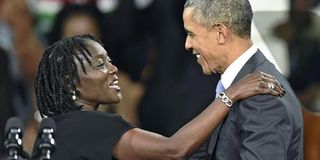Ridiculous sideshows grabbed media attention away from the vital GES

US President Barack Obama embraces his sister Auma at the Safaricom Stadium Kasarani gymnasium in Nairobi on July 26, 2015 after she invited him to give a speech. Barack Obama his first trip came all the way back in 1987, when the president was in his 20s. PHOTO | CARL DE SOUZA | AFP
What you need to know:
- Everyone wanted a piece of Obama. University of Nairobi students threatened to urinate on trees planted by Mr Obama in 2006 if he did not address them on campus, adding that if he failed to show up, the consequences would be “catastrophic, calamitous and cataclysmic”.
- They probably took their cue from Deputy President William Ruto, who recently asked the US President not to bring up the issue of homosexuality during his visit to Kenya, because “we are a God-fearing nation”.
- Until President Uhuru Kenyatta put a stop to this nonsense by proclaiming that homosexuality was a “non-issue” in the discussions he would be having with Mr Obama, the anti-gay protesters seemed hell bent on carrying out their threat — that too in the coldest month of the year.
Now that President Barack Obama has left Kenyan soil, maybe we can go back to being normal again — depending, of course, on how you define normality.
The Obama-mania of the past few days, and the many unnecessary and ridiculous sideshows that accompanied the US President’s visit, were not only embarrassing to Kenyans but the visiting dignitaries as well.
Yes, of course we love “our son” Barack Obama, and yes, of course we wanted him to meet us and give us his signature pat on the back, but surely did we need to go to such bizarre heights to gain his attention?
Everyone wanted a piece of Obama. University of Nairobi students threatened to urinate on trees planted by Mr Obama in 2006 if he did not address them on campus, adding that if he failed to show up, the consequences would be “catastrophic, calamitous and cataclysmic”.
Now, who in their right mind threatens the President of the United States in such crude, menacing language? Even Al-Shabaab would not have dared to do so.
The letter made me question the quality of our university education. Are university students so megalomaniacal to believe that the head of any country, let alone that of the United States, should depart from his busy itinerary and pay them a courtesy call?
The demand by university students, which even made headlines in the international press, made Kenyans look cheap and ludicrous. I suggest that those who wrote the letter be suspended for two weeks.
Hot on the heels of the university fiasco came another threat, this time by anti-gay protesters, who said they would walk naked on the streets of Nairobi, ostensibly to show President Obama the difference between male and female genitalia.
They probably took their cue from Deputy President William Ruto, who recently asked the US President not to bring up the issue of homosexuality during his visit to Kenya, because “we are a God-fearing nation”.
Until President Uhuru Kenyatta put a stop to this nonsense by proclaiming that homosexuality was a “non-issue” in the discussions he would be having with Mr Obama, the anti-gay protesters seemed hell bent on carrying out their threat — that too in the coldest month of the year.
Did they really think that they could get away with complete nudity in a country where women are often stripped and harassed for wearing miniskirts?
President Obama’s visit also gave Kenyans on Twitter (#KOT) plenty of opportunities to make their trademark jokes. The lack of any visible green grass (dubbed #KideroGrass) on Uhuru Highway despite the millions spent on landscaping by the Nairobi City County before the presidential visit was the subject of much mirth and ridicule, as was a CNN story describing Kenya as a “hotbed of terrorism”.
CNN should have known that Kenyans do not like to be stereotyped and painted in a negative light by foreigners — only Kenyans have the right to do so.
On a more serious note, there was some discussion within civil society organisations about whether the 17 NGOs selected to meet President Obama during his visit were representative of Kenyan civil society. A former anti-government activist, who is now a pro-government advocate, apparently did not think so.
He claimed that the NGOs selected had a distinctly anti-government agenda and were, therefore, biased.
In a letter that was circulated on some listservs, he told the US President: “If you go ahead and meet only these select members of Kenyan civil society only (sic) we will have no alternative but to assume that you are not interested in genuinely engaging or understanding Kenyan civil society sector but are only using this meeting with the select NGOs as a platform to perpetuate a specific partisan anti-government political agenda under the guise of interacting with Kenyan civil society.”
He further claimed that those selected were the “NGO section of the Kenyan political Opposition (sic).” Clearly, to be selected or “anointed” by the US President was an honour that many Kenyans were willing to kill for.
Meanwhile, amid all this was the serious business of the Global Entrepreneurship Summit, which was no doubt a success. Too bad that the sideshows got most of the media attention.





